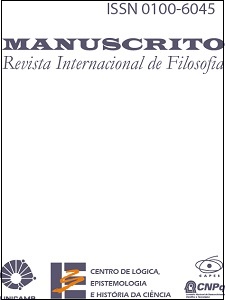Resumo
Starting from the sensuous perception of what is seen, an attempt is made at recasting a Husserlian theory of constitution of the object of intuition, as one leaves the natural attitude through a transcendental method, by positing several theses so as to avoid the aporias of philosophical binary oppositions such as rationalism and empiricism, realism and idealism, logicism and psychologism, subjectivism and objectivism, transcendentalism and ontologism, metaphysics and positivism. Throughout fifty-five theses on constitution, the Husserlian proposal of continuously reforming philosophizing by transcendental reduction is revisited, leaving the latter incomplete as new conversions are required by noetic-noematic correlations between world and consciousness.
Partindo da percepção sensível de algo que é visto, propomo-nos rever a teoria husserliana da constituição do objeto intuído, deixando a atitude natural em busca de uma argumentação transcendental que evite as aporias das contraposições filosóficas entre racionalismo e empirismo, realismo e idealismo, logicismo e psicologismo, subjetivismo e objetivismo, transcendentalismo e ontologismo, metafísica e positivismo. Através de cinqüenta e cinco teses sobre a constituição, revisitamos a proposta husserliana de continuamente reformar o filosofar mediante uma redução transcendental que não se deixe completar, na medida em que novas conversões são exigidas pela correlação noé- tico-noemática entre mundo e consciência.
Referências
HUSSERL, E. (1960). Cartesian Meditations: An Introduction to Phenomenology. Trans. Dorion Cairns. (The Hague, M. Nijhoff).
—————. (1965). “Philosophy as Rigorous Science,” in Phenomenology and the Crisis of Philosophy. Trans. Q. Lauer. (New York, Harper and Row).
—————. (1970a). The Crisis of the European Sciences and Transcendental Phenomenology: An Introduction to Phenomenological Philosophy. Trans. David Carr. (Evanston, Ill., Northwestern University Press).
—————. (1970b). Logical Investigations. 2 vols. Trans. J.N. Findlay. (London, Routledge & Kegan Paul).
—————. (1981). Husserl: Shorter Writings. Ed. Peter McCormick and F. Elliston. (University of Notre Dame Press) —————. (1982). Ideas Pertaining to a Pure Phenomenology and to a Phenomenological Philosophy. First Book. Trans. F. Kersten. (The Hague, M. Nijhoff).
—————. (1989). Ideas Pertaining to a Pure Phenomenology and to a Phenomenological Philosophy. Second Book. Trans. R. Rojcewicz and A. Schuwer. (The Hague, M. Nijhoff).
STEINBOCK, A. (1995). Home and Beyond: Generative Phenomenology after Husserl. (Evanston, Ill., Northwestern).
TUGENDHAT, E. (1992). Philosophische Aufsätze. (Frankfurt, Suhrkamp).
WELTON, D. (ed.) (1999). The Essential Husserl: Basic Writings in Transcendental Phenomenology. (Bloomington, Indiana University Press).

